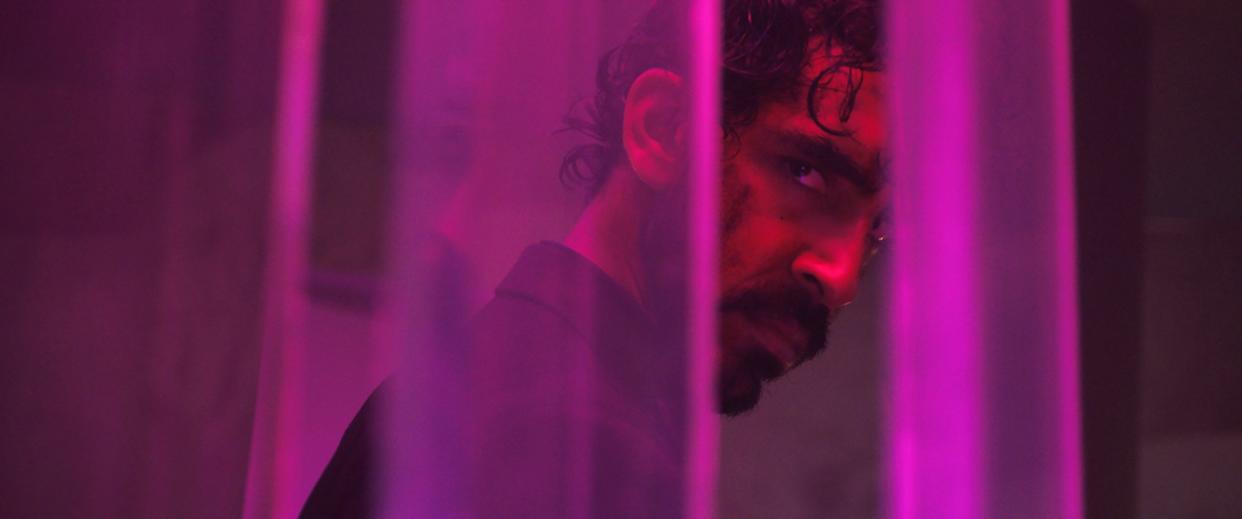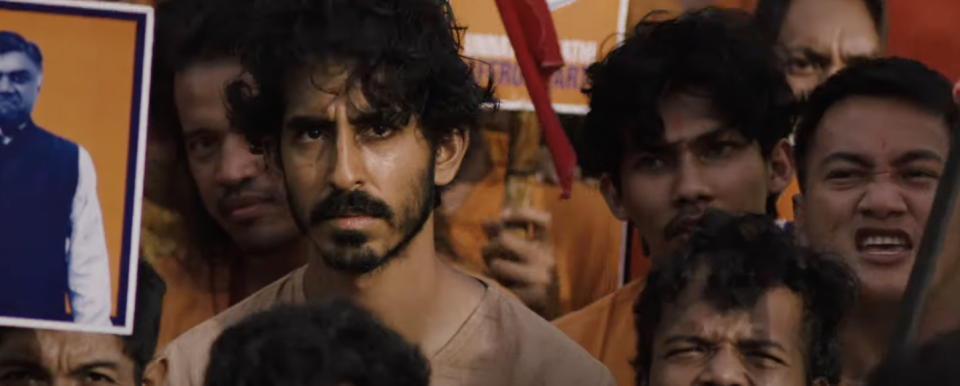‘Monkey Man’ Review: Dev Patel’s Directorial Debut Is a Bloody, Stylized Action Bone-Cruncher

Part of Bruce Lee’s action appeal is that he wasn’t a huge, hulking man. Instead, Lee derived his power as a martial artist from a mixture of nimble flexibility and lean muscle. He was light on his feet, but he punched hard, which made him a hero to underdogs who dreamed of being similarly underestimated. Dev Patel has a similar physicality and persona in his new movie “Monkey Man,” in which a scrappy nobody enacts bloody revenge on those who treat people like him like insignificant pawns.
Lee is one of many heroes to which Patel pays tribute in this grimy, ultraviolent mixtape of action influences, which has the chaotic unpredictability of Park Chan-wook’s “Oldboy,” the brutal intensity of Timo Tjahjanto’s “The Night Comes for Us,” the training arc of a Lau Kar-leung Shaw Brothers movie, and the neon gunplay of the “John Wick” franchise. The cuts are quick and the sound effects are bone-crunching, and were it not for an extended lull in the middle of the movie, it would be an exhilarating ride.
More from IndieWire
Patel stars as Kid, an orphaned boy from the Indian countryside who’s grown up to become a professional punching bag in the fictional city of Yatana. Every night, Kid gets into the ring at an underground fight club run by the greedy Tiger (Sharlito Copley) and lets himself get beaten bloody for cash while wearing a monkey mask. It’s a masochistic existence fueled by desperation, but it’s also a way of biding his time until he can find Rana (Sikandar Kher), the police chief who murdered Kid’s mother and burned his village to the ground.
A stolen wallet passed hand to hand through the slums of the city provides Kid with a pivotal clue that brings him into the office of Queenie (Ashwini Kalsekar), the chain-smoking, ball-busting manager of King’s Club, a restaurant that doubles as a hedonistic playground for the city’s elites. Kid talks his way first into the kitchen, then into a friendship with Queenie’s fixer Alphonso (Pitobash), then into a job serving vials of cocaine on a silver platter in the King’s Club VIP room. There, he meets Sita (Sobhita Dhulipala), a country girl now working as an escort under Queenie’s abusive thumb.
The film takes its time setting up the “John Wick”-esque world of the club, whose decadence contrasts with the poverty just outside of its walls. The first fight scene doesn’t occur until an hour in, but it’s a banger, beginning with Kid locking the door to the club’s bathroom behind him and barreling forward into a breathtaking chase through the streets of the city. The forward thrust of this sequence is thrilling, and although the camerawork is shaky, the general arc of the action scenes is always legible.
Patel allows himself to be humiliated in Kid’s first fight scene out of the ring — all the better to fuel his transformation later on. One of the most surprising moments in a movie where all manner of unconventional weapons cause creative mayhem comes when Kid runs towards a window in a top-floor hallway: According to conventional action-movie rules, he should crash through the window, preferably with shards of glass exploding behind him, and land unharmed on the pavement below. Not here. Instead, he bounces off of the pane, hurts his shoulder, and resumes getting the stuffing kicked out of him by club security.
There’s a story-driven reason for this, as well as a political one. Midway through the movie, Kid is taken in by a community of hijra, a traditional “third gender” driven from its once-sacred status during British colonial rule. Now, hijra in India are marginalized and persecuted, as trans people are worldwide. “Monkey Man” makes a case for solidarity between displaced villagers and hijra, and it’s under the tutelage of temple priestess Alpha (Vipin Sharma) that Kid overcomes the odds and matures from a reckless adolescent into a disciplined warrior.

The intent here is righteous — three hijra actresses make their screen debuts in “Monkey Man” — but the timing is unfortunate. Kid’s evolution requires the movie to stop and take a breath. Although a sequence where he trains using a sack of rice as the hijra rhythmically cheer him on is rousing, overall, the meditation is long enough to spoil the momentum of that first fighting sequence. We’ll pick back up soon enough, however, as Kid’s transformation into an action hero modeled after the Hindu monkey god Hanuman is complete.
“Monkey Man” is Patel’s feature directorial debut, and he goes just as hard stylistically as he does on screen. The film is shot largely in close-up, switches between first and third-person perspectives mid-scene, and features nauseating plunges down the sheer face of buildings that recall similar shots in Michael Bay’s “Ambulance.” It’s a free-for-all of headrush filmmaking, and Patel packs the frame with people and movement in crowd scenes that evoke the teeming excitement of urban India. Its lack of grounding wide shots makes the film feel unmoored at times, which inhibits emotional engagement. But the badass factor here is strong.
Given “Monkey Man’s” incendiary condemnation of India’s right-wing party and its violent oppression of minority groups — personified in the form of a villainous candidate for Prime Minister named Baba Shakti (Makarand Deshpande) — its politics mean that its theatrical prospects in India are uncertain. It was originally slated for streaming on Netflix, but was picked up for a North American theatrical release by Jordan Peele’s Monkeypaw Productions. Naming parallels aside, it fits the Monkeypaw mission of bringing bold, diverse voices to genre cinema, and Peele is one of the movie’s biggest cheerleaders. Like its hero, this film has been down, but it’s never been out. And its tenacity suits it well.
Grade: B
“Monkey Man” premiered at SXSX 2024. Universal Pictures releases the film on April 5, 2024.
Best of IndieWire
Sign up for Indiewire's Newsletter. For the latest news, follow us on Facebook, Twitter, and Instagram.

 Yahoo News
Yahoo News 
